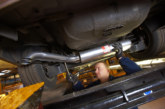
Our contributors offer their opinion on the government’s announcement that the 4-1-1 MOT test proposal has been scrapped.
David Clarke
Managing Director, Autosupplies (Chesterfield)
A good call on the decision to scrap new MOT proposals – there was simply too much at stake.
While significant technological progress has been made in modern vehicles, the main causes of MOT failures are still wear and tear on items such as tyres, brakes, steering and suspension, all of which would have gone unchecked for a further year on newer vehicles had the changes gone ahead.
When the proposed changes were announced, we were looking down the barrel of a gun, not just in terms of motorists’ safety as the paramount concern, but also in terms of livelihood and the health of the aftermarket as a whole.
We were faced with the prospect of around 1.5% of the total 31.7 million cars being driven on British roads no longer needing an MOT test, which may sound like a drop in the ocean, but equates to 300,000 cars. This would have amounted to a progressive slump in the demand for, and ultimately cost of, labour and parts.
Alongside regular services, MOTs are the lifeblood of any garage business. This would have had a massive impact on factors too, right back to the suppliers.
I mentioned previously that the changes, had they been implemented, could have decreased sales throughout the entire supply chain, with fewer drivers having a need to enter independent garages.
It is thanks to the likes of the IAAF, which has campaigned tirelessly against these changes and enabled us to be where we are today. As an industry we need to remain united in the months and years ahead, to ensure we overcome other major challenges that still loom heavily over the aftermarket, but for now this is undoubtedly a big step in the right direction.
Peter Welch
Proprietor, Scotlands Ash Garage
I ’m really buoyed on thismonth after hearing thenews that the proposed MOT changes have been scrapped. It’s a massive relief that common sense has prevailed!
In my view, to change the frequency of testing to 4-1-1 would have been complete madness. If it had gone ahead, we would have potentially seen an increase in road accidents and fatalities as this would have meant no formal inspection of a vehicle’s road worthiness for a further 12 months.
To ensure as safe and costeffective motoring as possible, it’s vital that motorists must have their vehicle inspected and serviced regularly. Given that figures suggest one in fivevehicles fail their MOT in the first three years, moving to an extended testing period would have potentially caused more accidents and fatalities due to defective vehicles on UK roads. We’re also talking about a likely increase in repair costs for drivers, insurance premiums and harmful emissions.
DVSA’s regulation of the MOT process and testing frequency of 3-1-1 helps to make UK roads the safest in Europe – why would anyone want to jeopardise that?
This time last year, we were all wondering where we would be if such a change took effect; it only added to the aftermarket’s volatile situation, what with issues concerning the connected car, Type Approval legislation that threatened aftermarket access to the OBD connector, and post-Brexit, to name some major ones.
Fast-forward to early 2018, and there seems to be better weather on the horizon, at least for two of these issues. Besides the proposed MOT changes being overhauled, the recent news that the EU has voted in favour of the amended Type Approval legislation is also a big thumbs up for the aftermarket.







